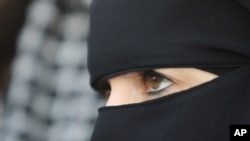PARIS —
Two years after becoming law in France, a ban on face-covering Muslim veils is facing a pair of high-profile legal challenges. The cases in French and European courts may force Paris to roll back the legislation and have ramifications elsewhere in Europe.
In 2011, France became the first European country to ban face-covering Muslim veils in public places. The legislation was generally to include items like ski masks as well as veils, but many felt it singled out France's five-million-strong Muslim community, the largest in Europe. The debate also spread across the region. Belgium followed France in adopting the ban. In September, so did a canton in southern Switzerland.
France argues the ban is needed for security reasons and to protect its secular traditions.
But today, France's ban faces legal challenges - one at the European Court of Human Rights in Strasbourg and another at a trial that opened this week in the Paris suburb of Versailles.
The plaintiff, a 20-year-old convert to Islam called Cassandra Belin, did not appear at the opening of the Versaille trial. But her lawyer, Philippe Bataille, questions the constitutionality of the ban, which was passed under the previous conservative government.
At the time, France's Constitutional Council, the highest legal body, had no objections to the legislation. But Bataille argues it should reexamine the ban, looking specifically at whether it violates personal freedoms and human dignity enshrined by French and European laws.
Bataille says the legislation is only acceptable in narrow circumstances - like airport checks - when a covered face could pose a security risk.
For some Muslims like M'Hammed Henniche, General Secretary of the Union of Muslim Associations of the Seine-Saint-Denis region outside Paris, the legislation makes no sense.
Henniche notes only a small minority of Muslim women in France wear the face veil. It's unlikely to change their habits, but it has succeeded in riling the larger Muslim community and giving France a bad name.
Henniche also lists a series of other debates in recent years - against minarets in mosques, street prayers on Fridays, halal meat and whether foreigners should vote. All have cemented a belief among French Muslims that they are being singled out.
French authorities estimate only a few hundred women have been stopped or fined for wearing veils since the ban came into effect. Many are repeat offenders. But the ban continues to spark deep divisions. In November, the European rights court in Strasbourg agreed to examine it.
Nicolas Cadene, of the government's Observatory on Secularism, says if the European Court decides the law goes against Europe's human rights convention, France may need to draft new legislation.
Verdicts for both the French and European court challenges will be delivered next year. And like the veil ban, they are likely to resonate far beyond France's borders.
In 2011, France became the first European country to ban face-covering Muslim veils in public places. The legislation was generally to include items like ski masks as well as veils, but many felt it singled out France's five-million-strong Muslim community, the largest in Europe. The debate also spread across the region. Belgium followed France in adopting the ban. In September, so did a canton in southern Switzerland.
France argues the ban is needed for security reasons and to protect its secular traditions.
But today, France's ban faces legal challenges - one at the European Court of Human Rights in Strasbourg and another at a trial that opened this week in the Paris suburb of Versailles.
The plaintiff, a 20-year-old convert to Islam called Cassandra Belin, did not appear at the opening of the Versaille trial. But her lawyer, Philippe Bataille, questions the constitutionality of the ban, which was passed under the previous conservative government.
At the time, France's Constitutional Council, the highest legal body, had no objections to the legislation. But Bataille argues it should reexamine the ban, looking specifically at whether it violates personal freedoms and human dignity enshrined by French and European laws.
Bataille says the legislation is only acceptable in narrow circumstances - like airport checks - when a covered face could pose a security risk.
For some Muslims like M'Hammed Henniche, General Secretary of the Union of Muslim Associations of the Seine-Saint-Denis region outside Paris, the legislation makes no sense.
Henniche notes only a small minority of Muslim women in France wear the face veil. It's unlikely to change their habits, but it has succeeded in riling the larger Muslim community and giving France a bad name.
Henniche also lists a series of other debates in recent years - against minarets in mosques, street prayers on Fridays, halal meat and whether foreigners should vote. All have cemented a belief among French Muslims that they are being singled out.
French authorities estimate only a few hundred women have been stopped or fined for wearing veils since the ban came into effect. Many are repeat offenders. But the ban continues to spark deep divisions. In November, the European rights court in Strasbourg agreed to examine it.
Nicolas Cadene, of the government's Observatory on Secularism, says if the European Court decides the law goes against Europe's human rights convention, France may need to draft new legislation.
Verdicts for both the French and European court challenges will be delivered next year. And like the veil ban, they are likely to resonate far beyond France's borders.




